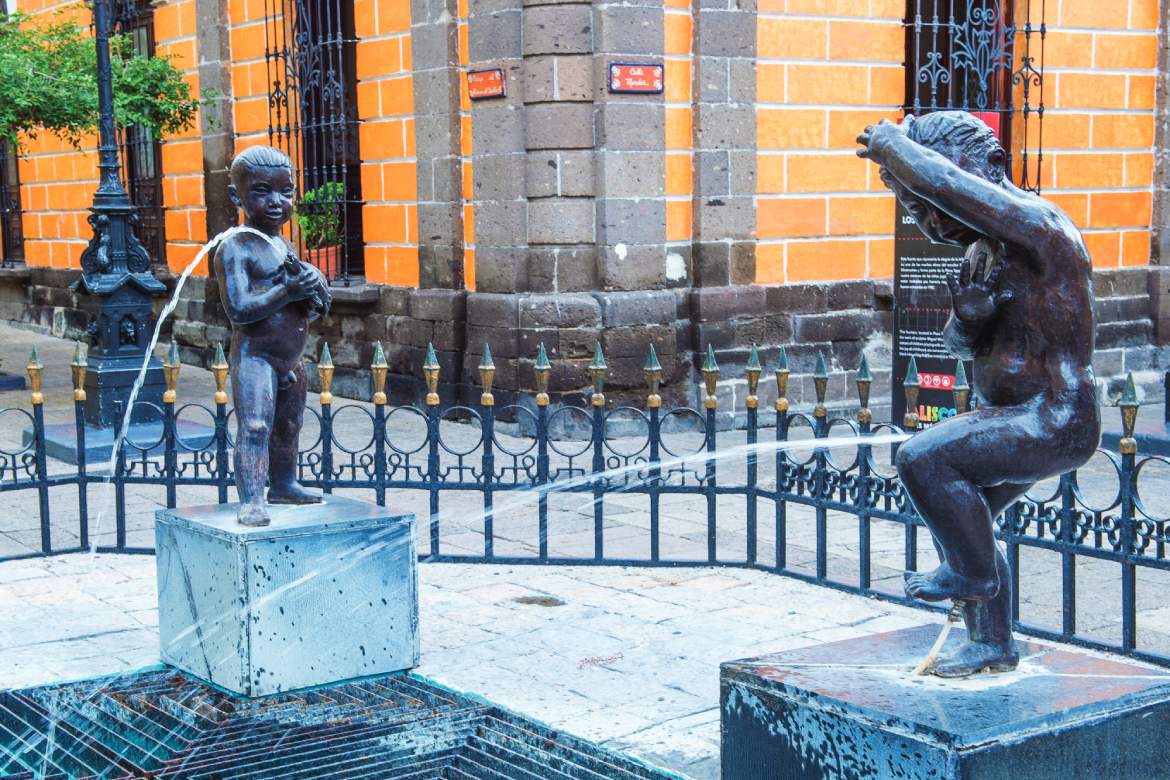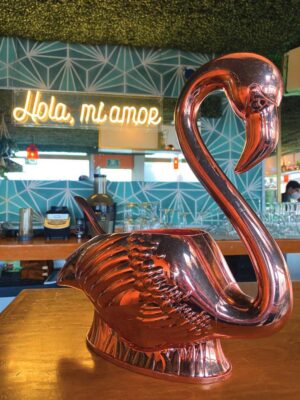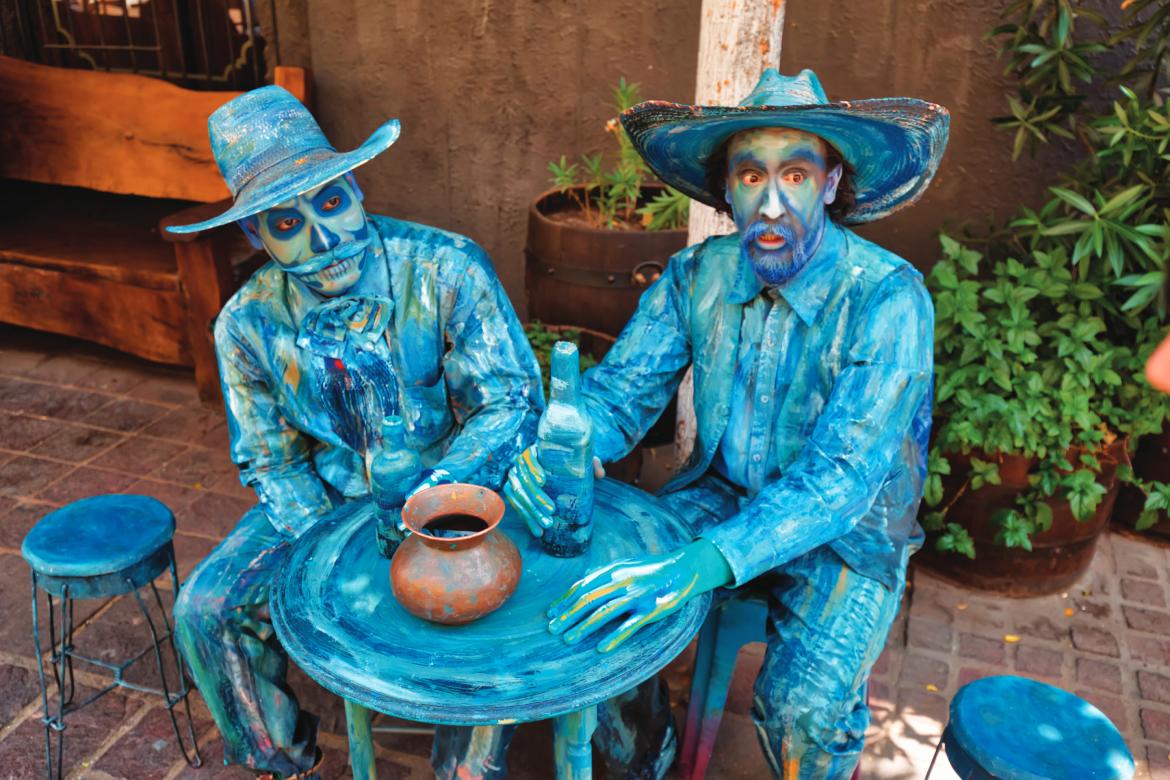Mexican art is celebrated all around the world, but in Guadalajara, the creative scene goes far beyond the expected, offering a particularly multifaceted experience with works that address everything from Mexican history to social issues, to natural beauty and LGBTQ rights.
As Mexico’s second-largest city, Guadalajara has long attracted artists of every stripe, and the destination has become an especially rewarding place to visit for art lovers, with an array of public and private exhibitions.

Orozco mural in Hospicio Cabañas (Photo by LatinFlyer.com)
The city’s most visible artist, without a doubt, is Jose Clemente Orozco (1883-1949), a painter born in the state of Jalisco. His spectacular murals, which tackle political and social issues like national identity, race, and poverty, grace the interiors of various structures around the city. The most impressive venue exhibiting his work, by far, is Hospicio Cabañas (Cabañas 8, Tapatía, Zona Centro. Tel. +52-33-3668-1642. museocabanas.jalisco.gob.mx), a sprawling UNESCO World Heritage Site that was built in the early 19th century to provide care for orphans, senior citizens, and the handicapped. Now a major center for the arts, the facility features some of Orozco’s most dramatic work, which bathes the walls and ceilings in the former chapel. Hospicio Cabañas also hosts a variety of permanent and temporary exhibits throughout the year by multiple artists.
Orozco’s mastery of the mural format can also be witnessed at the nearby Palacio de Gobierno (Government Palace), a functioning government building that dates to 1774. The general public is usually allowed into the central courtyard and passages, where the artist’s 1937 mural of Mexican independence hero Miguel Hidalgo stares down over a grand staircase, with throngs of citizens depicted in a struggle against fascism. A second mural, in the former congress hall, shows Hidalgo, Benito Juarez, and other important players in the creation of the Mexican republic.
[carousel_slide id=’28328′]
Just outside of the historic downtown is Museo de las Artes Universidad de Guadalajara (Avenida Juarez 975, Americana. Tel. +52-33-3134-1664. musaudg.mx), which is housed in a beautiful example of French Renaissance architecture. Orozco’s striking murals called “Man the Creator and Rebel” and “The People and Their False Leaders” dominate the museum’s small auditorium, while the museum also hosts a diverse number of contemporary art exhibits, often including LGBTQ artists from Mexico and abroad.
Known for its forward-thinking exhibits is the Ex Convento del Carmen (Avenida Juarez 638, Centro. Tel. +52-33-3030.1355. sc.jalisco.gob.mx/noticias-referencias/ex-convento-del-carmen), a 17th-century former church and convent that has been converted into a sizeable art museum run by the state’s Secretary of Culture. Previous exhibits have addressed the LGBTQ rights struggle in Mexico and elsewhere.

Zapopan basilica (Photo by LatinFlyer.com)
Some of the city’s most popular neighborhoods for general tourism are also ideal for artistic exploration. The creative hub in Zapopan, for example, is the Museo de Arte de Zapopan (Andador 20 de Noviembre 166, Zapopan. Tel. +52-33-3818-2575. mazmuseo.com).

El Hombre Gallo by Sergio Bustamante (Photo by LatinFlyer.com)
In much-visited Tlaquepaque, people can admire the work Sergio Bustamante, an artist known for his public sculptures on the waterfront promenade in Puerto Vallarta. The Sergio Bustamante Gallery (Independencia 238, Centro, Tlaquepaque. Tel. +52-33-3639-5519. coleccionsergiobustamante.com.mx) is an excellent place to shop for his work, while the Carlos & Albert Gallery (Independencia 159, Tlaquepaque. Tel. 33-3838-2727. carlosalbert.com.mx) stocks the work of the venue’s eponymous owners.
Art collectors, indeed, will find lots to love in Guadalajara. Other noteworthy contemporary art galleries include Ladera Oeste (Colonia 221, piso 8, Americana. Tel. +52-33-2000-8184. laderaoeste.org), Páramo (Hidalgo 1228, Americana. Tel. +52-33-3825-0921. paramogaleria.com), and Galeria Tiro Al Blanco (Juan Alvarez 833, Sagrada Familia. Tel. +52-33-3826-5674. galeriatiroalblanco.com)
Visitors to Guadalajara can also take in some rather impressive artwork even when walking down the street, thanks to the city’s array of public sculptures. One of the newest works is the statue of Tenamaztle, which recently debuted in downtown Guadalajara in tribute to a man who’s considered one of the region’s first human rights defenders.
During the 16th century, Tenamaztle represented indigenous communities while on trial in Spain. A few steps away stands the statue of Beatriz Hernández, a woman who, in the 1500s, convinced European colonialists to move the city of Guadalajara to its fourth and current location.

Fuente de los Ninos Miones (Photo by Kobby Dagan)
Amazing sculptures abound on the pedestrian streets of downtown Guadalajara. Among the most photographed are the Fuente de los Niños Miones (Fountain of the Playful Children), which in some ways recalls the Mannekin Pis in Brussels, and Árbol Adentro, a giant sculpture of a human head created by artist José Fors; the stairway that allows visitors to ascend to the top make it an even more exciting experience. The stately Rotonda de los Jaliscienses Ilustres meanwhile, honors multiple important figures in the state’s history.

Matilde Mi Amor (Photo by LatinFlyer.com)
LGBTQ travelers should also keep their eyes out for the next edition of Festival Prohibido.( instagram.com/prohibido.mx), a semi-annual celebration of arts, culture, and eroticism. For the most thorough overview of Guadalajara’s creative side, check out Antiturista (antiturista.com), a website and artsy guide created by Alex Serratos, owner of Peligro al Fondo restaurant (Miguel Lerdo de Tejada, Americana. Tel. +52-33-3825-6197. instagram.com/peligroalfondo) and a major player in the city’s LGBTQ community.
Also worth a look is Cream (cream.mx), an arts and design magazine produced in Guadalajara that highlights local artists, designers and galleries. In a city as vibrantly creative as Guadalajara, art, culture, and inspiration can be discovered around every corner.


